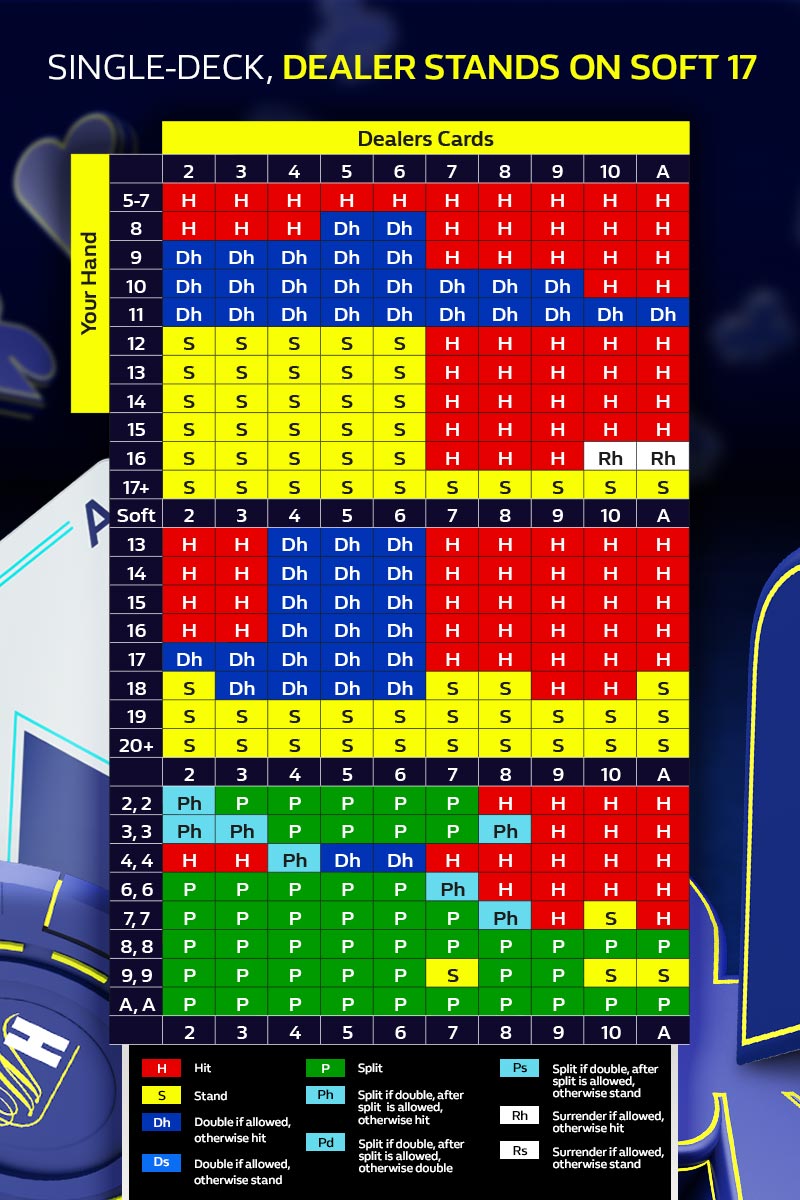Best Strategy To Win Blackjack
One popular search query on the internet, according to Google, is the following question:
To actually win at normal casino blackjack in the long run, however, you have to start by counting cards-not because card counting is the best or most profitable way to win at blackjack, but because the principles behind card counting are the same principles that are behind every type of professional gambling at blackjack, even methods that.
Dec 29, 2018 Learn Basic Blackjack Strategy. Before you even hit the casino floor, brush up and study the basic strategies of blackjack. After all, you can't expect to win if you don't know how to play because luck can only take you so far. Jun 09, 2020 Overall, best of all, the basic strategy works when splitting or doubling. Yes, according to statistics, you will win at blackjack once for twenty hands, but, for those who do not like risking, the basic strategy is a good option. If you want to apply the above-mentioned table in practice, online gambling establishments might help you to do this.
What is the best strategy to win playing real money blackjack?
Most of the time, when you search for blackjack strategy on the internet, you’ll find a post explaining how you should always use basic strategy.
That’s good advice, as far as it goes. But basic strategy isn’t really a strategy at all. It’s just a list of tactics.
In this post, I’ll examine the difference between a blackjack strategy and blackjack tactics.
I’ll also some advice on coming up with a strategy for winning at blackjack.
What’s the Difference between Blackjack Strategy and Blackjack Tactics?

A strategy is an overall approach to achieving a goal. With blackjack, most people have a goal of winning more money than they lose.
See Full List On Wikihow.com
A tactic, on the other hand, is a specific action to take at a point during the execution of your strategy.
It’s a subtle difference, but it’s an important distinction to make.
Here’s an example of a blackjack tactic:
You get a total of 11 for your first 2 hands, and the dealer’s showing a 6. You decide to double down.
That’s a tactical decision. (It’s also the correct tactical decision.)
Here’s an example of a blackjack strategy:
You accumulate a bankroll of $10,000 before starting. You memorize and drill yourself on basic strategy until you’re 100% confident that every decision you make is mathematically correct at the blackjack table.
Then you learn the Hi-Lo Counting System, which you also practice and drill until you can do it without mistakes and without anyone knowing you’re counting.
You bet between 1% and 5% of your total bankroll on every hand, depending on the count.
That’s an example of a blackjack strategy, because it describes your overall approach to the game.
A Bankroll Management Strategy for Blackjack
I don’t remember what the context was, but years ago a poker player friend of mine mentioned that if you have a negative expectation, you need an infinite bankroll.
His point was well taken, and it applies to blackjack as well as real money poker.
The first step to having a blackjack strategy for winning is to figure out a way to get a positive mathematical expectation and managing your bankroll appropriately.
Most people understand that getting a positive expectation is as simple as learning and mastering a card counting strategy like the Hi-Lo. I’ll have more to say about counting cards and other advantage techniques in blackjack soon, but first, let me address bankroll management.
You need enough money in your bankroll to withstand the vagaries of fortune. No matter how good you are at blackjack, you’re going to have a small edge at best.
If you bet too high a percentage of your bankroll on each hand, you risk going broke before the long run kicks in.
A positive expectation only works in the long run.
I suggest not betting more than 1% to 5% of your bankroll on a hand of blackjack, no matter how good at the game you think you are.
This means that if you have a bankroll of $1000, you’d be betting between $10 and $50 per hand.
If you have a bankroll of $10,000, you’re betting between $100 and $500 per hand.
And keep in mind that you still have the possibility of going broke. Blackjack is a random game, even if you have appropriate strategies and bankroll management in place.
Casinos are able to withstand the vagaries of luck because they’re backed by tremendous bankrolls in the millions of dollars.
Most casinos could make a profit offering even money games just because they can absorb losing streaks better than players.
That’s the first pillar of your winning blackjack strategy – appropriate bankroll management.
Basic Strategy in Blackjack
The next thing you need to do is master basic blackjack strategy.
Basic strategy is just the mathematically best way to play every hand in the game.
Some hands are good and have a positive expectation almost any way you play them. Many hands are terrible and have a negative expectation any way you play them.
Basic strategy has looked at the expectation of every possible action in every possible situation and chosen the one with the highest mathematical expectation.
If you’re in a situation where multiple decision have a positive expected value, basic strategy tells you which decision has the highest positive expectation.
If you’re in a situation where every decision has a negative expectation, basic strategy tells you which decision loses you the least amount of money in the long run.
When you see people talking about how the house edge in blackjack is less than 1% or less than 0.5%, these estimates assume that you’re using basic strategy to make your decisions.
The average gambler, just playing by feel or guesswork, adds 2% to 4% to the house edge just by making basic strategy mistakes.
So, if you want to win at blackjack, you must master basic strategy first.
This will get you to where the house edge is as low as possible.
Learning How to Count Cards
Counting cards doesn’t require you to memorize all the cards that have been played so that you know which cards are left in the deck.

Best Blackjack Strategy » Learn Basic & Advanced Strategies
To succeed at card counting, you just need a way of estimating the ratio of high-value cards to low-value cards still in the deck.
Why does card counting work to get you an edge in blackjack?
The answer is simple:
You get paid off at 3 to 2 odds for a natural – a 2-card hand totaling 21.
The only way to get a blackjack is to get an ace and a card valued at 10 (the 10s, jacks, queens, and kings are worth 10 points each).
When a random deck of cards is dealt, the ratio of 10s and aces in the deck to the lower cards in the deck changes based on which cards have been dealt.
Sometimes you’ll wind up with a deck where there are more low-value cards than high-value cards.
And sometimes you’ll wind up with a deck where there are more high-value cards than low-value cards.
When there’s an imbalance resulting in a lot of 10s and aces, you have a higher probability of getting that 3 to 2 payout, so it makes sense to bet more in those situations.
When the reverse is true, you should bet less.
Here’s a simple way to figure this out:
The Hi-Lo Count
The most basic and probably most popular card counting method is the Hi-Lo System. Using this system, you assign a +1 or -1 value to some of the cards in the deck. You keep a running tally, called “the count,” using this plus or minus 1 system.
When low cards come out of the deck, the deck gets better for the player. These cards get counted as +1. The low cards that matter in the Hi-Lo Count are the 2s, 3s, 4s, 5s, and 6s.
You’ll notice that the 7s, 8s, and 9s aren’t mentioned. For the purposes of this counting system, they each count as 0.
When the count is positive, you’ll bet more.
When the count is 0 or negative, you’ll bet less.
Just by doing this, you can convert a negative expectation game into a positive expectation game.

Drilling and Practicing
To learn how to do this, start by practicing at your kitchen table. Count through an entire deck of cards, adding and subtracting one. Time yourself.
You should arrive at a total of 0 when you get through the entire deck.
If you wind up with another total, you made a mistake, and you need to slow down and try again.

Once you can get to 0 several times in a row, it’s time to try to get faster.
The first step to doing this is to deal 2 cards at a time and count them that way.
This is will more accurately simulate what you’ll face in the casino anyway. Blackjack moves fast, especially if you’re heads-up with a dealer. An average casino dealer can deal over 200 hands per hour when playing heads-up with a player.
You should practice in conditions that simulate a casino. Turn the TV and the radio on at the same time so that you can deal with the noise. Get the kids to play in the kitchen while you’re practicing. That will help you deal with the peripheral activity going on within sight of you.
When you get to the casino, size your bets based on the count.
If the count is +1, increase the size of your bet from $10 to $20.
If it’s +2, increase the size of your bet from $10 to $30.
And so on, up to 5% of your bankroll.
Limit yourself to an hour at a specific table in a specific casino, and try to visit the casinos during different shifts.
Conclusion
The best strategy to win at blackjack is to master basic strategy, learn to count cards, and risk less than 5% of your bankroll on a single bet.
Then don’t caught by the casino.